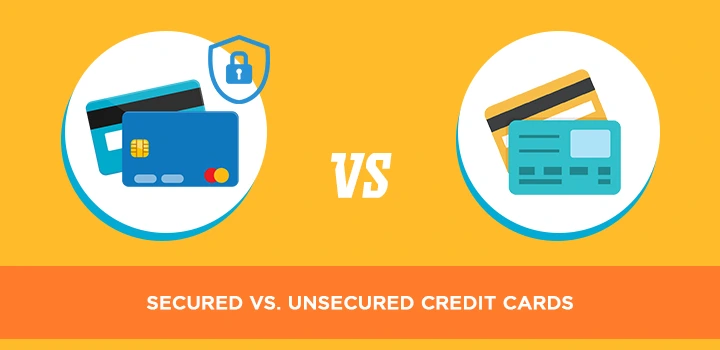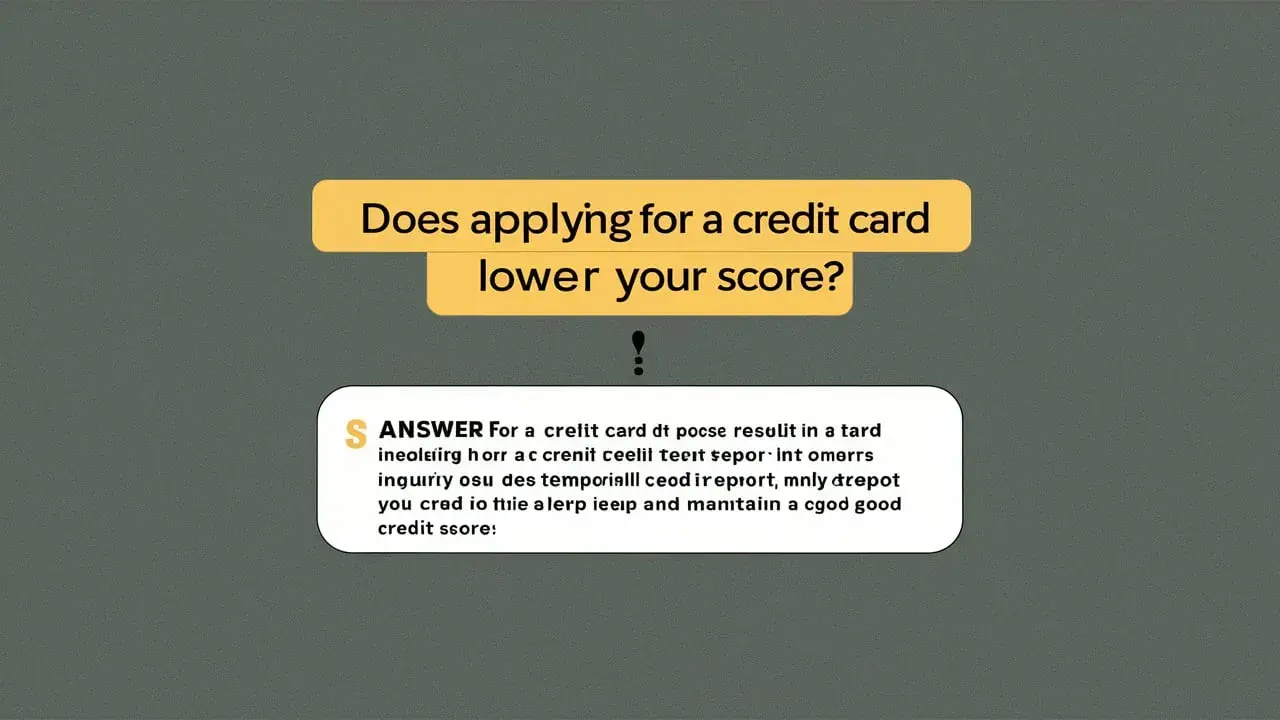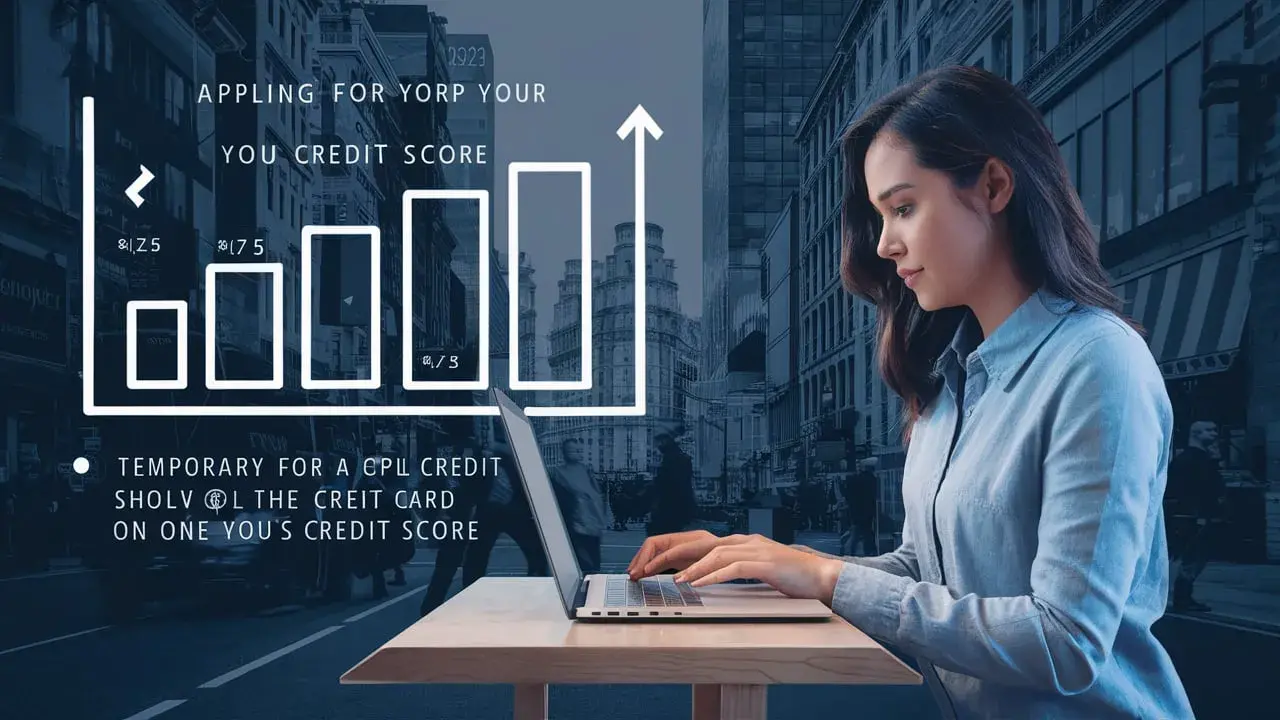-
Posted on: 11 Aug 2023

-
When deciding between secured and unsecured credit cards, your financial status may be much changed by your choice. Making a wise decision requires knowledge of the variations between these two kinds of cards. We will examine the real information about secured and unsecured credit cards in this blog article, balance their advantages and disadvantages, and help you make the best choice for your financial situation. Thus, keep reading to learn the main variations between secured and unsecured credit cards, regardless of your credit development or search for superior rewards.
Financial Type/Services
Secured credit cards
Unsecured credit cards
Cash deposit
Required
Not required
Credit limit
Lower. Usually equal to the deposit
Higher, depending on credit score
Interest rates
Higher, often more than 20 percent
Lower, depending on credit score (14–20 percent)
Credit check
Often not required
Required.
Fees
Usually
Generally only for reward cards
Helps to build credit
Yes, if the card issuer reports to credit bureaus
Yes
How do secured credit cards work?
For those trying to either establish or rehabilitate their credit, secured credit cards are a great financial tool. Unlike conventional credit cards, they run differently and call for a security deposit to ensure the credit limit is guaranteed.
- Knowing the Basics: Regular credit cards and secured credit cards operate in the same manner. The main distinction is that, with a secured card, the cardholder has to provide collateral—usually as a security against the credit limit—a cash deposit. Should a cardholder neglect to make payments, this collateral guarantees a backup for the card issuer.
- Finding the credit limit of a secured credit card depends on the amount the cardholder placed in a cash deposit. Usually depending on the issuer's regulations, the credit limit is equal to the deposit or a portion of it, ranging from 50% to 100%. A $500 deposit may, for instance, guarantee a credit limit of $500 or more.
- The third is one of the main reasons individuals use secured credit cards is to either create or restore their credit history. Using a secured credit card responsibly—that is, making on-time payments, keeping a low credit usage ratio, and displaying sensible financial behavior—helps build a good credit history. Your good credit score can rise over time, qualifying you for improved financial prospects.
- Most often, secured credit cardholders may recover their security deposit after a certain period of appropriate credit activity. Before you qualify for a return of your money, many months or maybe a year will pass. Once you have shown your trustworthiness, certain credit card providers may also let you upgrade your secured credit card to an unsecured credit card.
- Interest Rates and Fees: Secured credit cards contain interest rates, yearly fees, and sometimes extra costs, the same as regular credit cards. Reviewing the terms and conditions before applying for a secured credit card is vital if one wants to completely grasp these expenses. Because lending credit to those with limited or damaged credit records carries risk, certain lenders may demand higher fees or interest rates.
- Using a secured credit card responsibly helps you to realize its advantages and create a strong credit record:
- Make timely and complete payments for your bill amount.
- Keep your credit use ratio less than thirty percent.
- Whenever at all possible, avoid carrying a balance.
- To guarantee accuracy, routinely review your credit report.
- Steer clear of concurrently applying for many credit cards as it could damage your credit.
Do secured credit cards help your credit?
Indeed, secured credit cards might raise your financial situation and credit score. This kind of card needs a cash deposit as collateral, which gives the lender protection should you miss your installments. Usually, your credit limit equals this deposit, which gives you the same spending authority as a regular credit card. Using a secured credit card sensibly will show that you can control credit and pay on time—qualities that are very essential for developing excellent credit.
Furthermore offering a chance to build good credit habits are secured credit cards. Using a secured credit card requires consistent, on-time payments as well as modest use of the card. Utilization rate is the portion of your available credit you utilize. Keeping your use rate under 30% shows good credit management, which over time may help your credit score.
Although secured credit cards may help to improve credit, it's important to choose the correct card and lender very carefully. Search for cards with fair interest rates, either minimal or no annual fees, and lenders that document your behavior to the main credit agencies. To further grasp any possible card fees or limits, also carefully go over the terms and conditions.
Pros and Cons of secured credit cards
For those wishing to start or restore their credit history, secured credit cards might be seen as a stepping stone. A cash deposit covering these cards acts as collateral, therefore lowering the lender risk. Secured credit cards do, however, offer advantages and drawbacks, just like any financial instrument.
- One first. Secured credit cards provide those with little or bad credit history an opportunity to improve their credit ratings. Regular, on-time payments and modest credit usage help consumers show good credit behavior.
- Getting a secured credit card usually comes simpler than getting an unsecured card. Lenders are more likely to accept applications—even for people with less-than-perfect credit—because the deposit acts as collateral.
- Using a secured credit card helps you to develop financial discipline. Users are compelled to control their expenditures and live within their means by having a credit limit set equal to the deposit.
- Many secured credit card companies routinely monitor customers' accounts. Users who show consistently responsible conduct over time might be qualified for an unsecured credit card with a greater credit limit.
- Globally, secured credit cards are often accepted exactly as their unsecured counterparts are. For those who travel or buy online from foreign companies, this makes them handy.
Cons:
- Secured credit cards call for an upfront deposit ranging from a few hundred to several thousand dollars. Acting as collateral, this deposit might tie up money meant for another use.
- Many secured credit cards contain yearly fees, which might reduce the credit that is accessible. Furthermore, the interest rates on these cards might be more than on conventional unsecured cards.
- Usually equivalent to the deposit placed, the credit limit on secured cards might be restricting for individuals wishing to make more significant purchases. If it's tough to maintain low balances, this may also influence credit use ratios.
- Lack of Rewards: Many times, secured credit cards lack additional benefits or reward systems usually seen with unsecured cards. Users so lose out on cashback, travel points, or other rewards.
- Though secured credit cards offer better acceptance rates, consumers are not assured approval. When evaluating applications, lenders still weigh income, job history, and other financial commitments.
How do unsecured credit cards work?
A common financial instrument for those trying to create or improve their credit history is unsecured credit cards. Unsecured credit cards differ from secured credit cards in that they do not call for collateral; they only need a cash deposit.
- Unsecured credit cards are a more easily available choice for those with little resources as they are not backed by any collateral and provide more freedom. Greater financial freedom results from borrowers not having to deposit a set amount to create an account.
- The lender determines credit limit: Factors like borrower credit history, income level, and debt-to-income ratio help the lender decide the credit limit of an unsecured credit card. The credit limit would be bigger the higher the income and credit score.
- Unsecured credit cards run a revolving credit system. The borrower therefore has a defined credit limit and may make purchases up to that amount using the card. A minimum payment is due every month; the leftover debt rolls over with interest charges for the following month.
- Fees and interest rates: Generally speaking, unsecured credit cards have higher rates than secured credit cards or other loan varieties. Lenders also may levy yearly fees, late payment penalties, balance transfer fees, cash advance costs, and overseas transaction fees. Before seeking a card, one must study and comprehend the terms and restrictions.
- Unsecured credit cards might help those trying to either create or enhance their credit history. A good credit profile may be developed via responsible card usage, including timely payments and minimal credit use. With time, this may help your credit ratings rise and increase your eligibility for greater credit prospects.
- Risk of debt accumulation: Although unsecured credit cards provide freedom, users should be aware of their expenditure behavior. Should consumers build too much debt and find themselves unable to pay, financial hardship, credit score damage, and extra fines might follow. Use these cards sensibly and within your limits; otherwise, you risk losing them.
- As customers show good credit card usage and create a solid credit history, lenders may raise the credit limit on their unsecured credit cards. This may increase financial flexibility and assist in enhancing credit use ratios, thus affecting credit ratings.
Pros and cons of unsecured credit cards
Unsecured credit cards have become increasingly popular in recent years due to their accessibility and convenience. These types of credit cards do not require collateral, making them a suitable option for individuals who may not have assets to secure their credit lines.
Pros of Unsecured Credit Cards:
- One of the key benefits of unsecured credit cards is their great availability to a large spectrum of people. You may still be qualified for an unsecured credit card regardless of your credit history—average, poor, or none at all.
- Unlike secured credit cards, unsecured credit cards do not call for collateral—that is, a cash deposit or a claim on an asset. For people without substantial assets to use as collateral, this might be a major benefit.
- Convenience: You are free to make purchases at any retailer that takes unsecured credit cards. This ease lets you make payments, make online purchases, and even travel without worrying about lugging around big quantities of cash.
- The fourth is unsecured credit cards provide those with either little or no credit history a chance to improve their credit ratings. Using the card sensibly and paying on time can help you build a good credit record, which will help you when you apply for loans or other credit products down the road.
Cons of Unsecured Credit Cards:
- One should have higher interest rates: Generally speaking, unsecured credit card interest rates—especially for those with bad credit—are higher than those of secured credit cards or other kinds of borrowing. If you have a debt or pay late, this might cause further expenses.
- Unsecured credit cards generally have smaller credit limits, especially for people with bad credit. If you must make large expenditures or need emergency money, this might provide a problem. But if you regularly pay on time and show good credit conduct, you might be eligible to ask for a credit limit increase over time.
- Certain unsecured credit cards could have yearly fees. These costs range greatly from fair to outrageous. Before applying, one should give much thought to the card's related expenses.
- Although unsecured credit cards provide financial freedom, if used carelessly they might raise your chance of being in debt. Should you overspend and carry a balance, high-interest charges may build up and create a debt cycle that is difficult to escape.
Is it better to have a secured or unsecured credit card?
Choosing a secured or unsecured credit card is one crucial choice one has to make while looking at credit card alternatives Every kind of card has benefits and factors to be taken into account before choosing.
Usually advised for people with little credit history, poor credit score, or for those trying to restore their credit are secured credit cards. Users of these cards must provide a refundable security deposit acting as credit limit collateral. Many times, the credit limit is equivalent to the security deposit amount. Since regular payments and appropriate use help to raise credit ratings, secured credit cards provide a chance to develop or increase trustworthiness. Because borrowers have to have the money to get the card, they also provide a degree of financial discipline. One drawback of secured cards, however, is that compared to unsecured cards, they can have higher interest rates and fees.
Conversely, unsecured credit cards do not call for a security deposit. They are granted to people depending only on creditworthiness, income, and credit history. Usually featuring larger credit limits and more spending freedom, unsecured credit cards Those with better-improving credit scores a clean credit record already might find these cards helpful. Compared to secured cards, unsecured credit cards also often have cheaper interest rates and fees. For people with poorer credit ratings, they may be more difficult to get, however, and if not utilized sensibly you run the danger of overspending.
Ultimately, the decision between a secured or unsecured credit card comes from your financial situation and objectives. Should the main goal be credit building or reconstruction, a secured card might be the best choice. On the other hand, an unsecured card might be more appropriate if the person has an excellent credit score and is seeking greater spending freedom. To keep a good credit profile, one should eventually pick a credit card that fits personal financial objectives and utilize it sensibly.
Your dream home or car is within reach—call (888) 803-7889 for credit repair!










